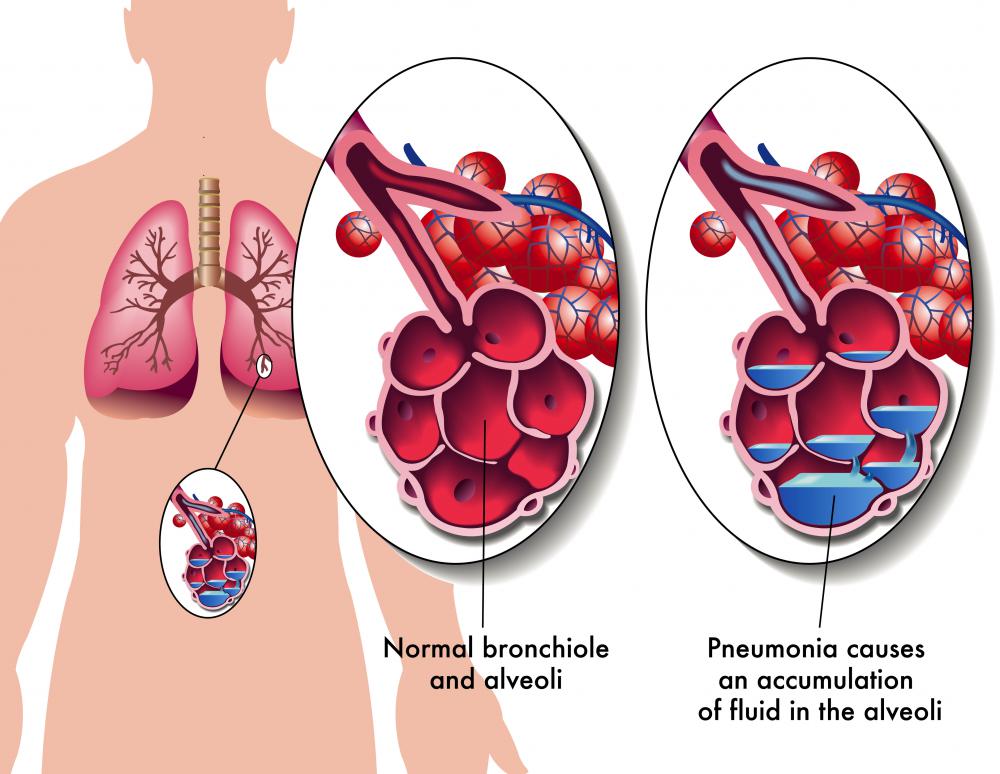At TheHealthBoard, we're committed to delivering accurate, trustworthy information. Our expert-authored content is rigorously fact-checked and sourced from credible authorities. Discover how we uphold the highest standards in providing you with reliable knowledge.
What is Fungal Pneumonia?
Fungal pneumonia is an infection in the lungs where fungi are the causative organism. It can be endemic in nature, indicating an infection caused by pathogenic organisms known to cause disease in healthy and sick people alike, or opportunistic, involving a fungus that normally doesn't make people sick, but will cause infection in people with compromised immune systems, such as cancer patients. Treatment for fungal pneumonia requires administering an appropriate antifungal medication and providing the patient with supportive care so the medication has an opportunity to work.
A common cause of fungal pneumonia in healthy people is occupational exposure. People who work around feces, in environments where a lot of fungus is present, or in facilities where fungi are used to produce products can all be at risk of fungal pneumonia. Wearing facial protection is usually advised when people will be exposed to fungus, as for example when people are clearing out a home after water damage. People can also develop fungal pneumonia as a result of something they do recreationally; cavers, for example, can get this lung infection as a result of inhaling fungus from bat guano.

In individuals who have weak immune systems, sometimes fungal pneumonia is caused by organisms that normally live on the patient and don't cause problems. In other cases, patients become infected when they are exposed to people who carry the spores. The immune system might normally fight off the spores and prevent them from multiplying, but in patients with immunocompromise, the body is defenseless and cannot stop the fungal infection.

Fungal pneumonia typically causes fever, difficulty breathing, and coughing. The patient may develop a bluish tinge at the extremities if the breathing becomes significantly impaired, limiting the supply of oxygen to the body. Immediate treatment involves giving a broad spectrum antifungal and collecting cultures of lung sputum to gather more specific information about the causative fungus. If the patient cannot breathe independently, a respirator may be used, while other patients may be given supplementary oxygen to help them breathe more comfortably.

Patients with fungal pneumonia can develop signs of damage in other organs like the heart, kidneys, and liver. If this infection is identified, the patient is carefully evaluated for complications like these so prompt treatment can be provided before they become a serious medical issue. In patients with poor immune systems, mortality rates can be as high as 90% with this infection, while relatively healthy patients have a much better prognosis and a good chance of recovery if they are provided with aggressive and timely treatment.
AS FEATURED ON:
AS FEATURED ON:
















Discussion Comments
It sounds like fungal pneumonia symptoms are the same as those of other types of pneumonia. It would be hard for someone to tell what kind of pneumonia they had without the help of a doctor. Of course, most people with pneumonia are so sick that they actually want to see a doctor.
Post your comments